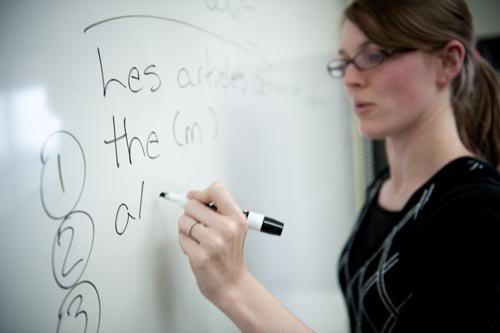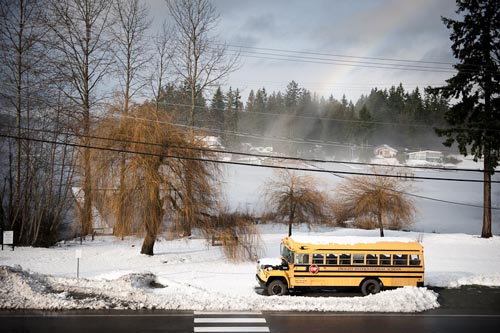
“在中美. 不能將目前的重點放在特許學校上來改善其對所有乃至大多數兒童的教育體系, 更多測試, 教師評估和工會抨擊. 在表現最佳的國家/地區中,這些功能均不存在. 必須著重於幫助所有學校改善, combining pressure with lots of support. That is how to improve system performance” — 博士. 奔萊.
博士. Levin is a Professor and Canada Research Chair in Education Leadership and Policy at the Ontario Institute for Studies in Education, 多倫多大學. He has worked with private research organizations, 學區, provincial governments, and national and international agencies, as well as building an academic and research career. He served as Deputy Minister (chief civil servant) for Education for the Province of Ontario from 2004 對 2007 and again in 2008-09. 從 1999 通過 2002, he was Deputy Minister of Advanced Education and Deputy Minister of Education, Training and Youth for the Province of Manitoba. He has published five books, most recently, How to Change 5000 學校. His current interests are in large-scale change, poverty and inequity, and finding better ways to connect research to policy and practice in education.
什麼樣的教育系統將允許一國擁有全球競爭所需的人際交往能力?
It’s a very broad question, but essentially the way I would answer it is that you need a system which is both high quality and high equity. 那是, large numbers of students who are achieving high levels of skill and confidence, and where the gaps that are based on extraneous factors are small.
What are your views on the standardized testing currently used?
Having good reliable data on student progress and outcomes is essential to making progress. There are lots of indicators other than tests, which are only one measure. 例如, 畢業率, participation and success in tertiary education, labor market experiences, proportions of kids referred to special education, and proportion of kids making a year of progress each year are also relevant measures. Where we are going to use testing, we need to make sure that the tests are of a high quality and linked to curriculum or like PISA, we need to clearly identify important competencies. Test results and other outcome data should not be used punitively; you cannot scare people into excellence.
Do you think the systems we have in place are sufficient to test the broad range of students?
There is no measure that is perfect. Every measure is partial and every measure has error in it, so one needs multiple measures to form a better picture. PISA has tried hard to get at critical thinking, and the tests in Ontario on elementary literacy and numeracy have a very substantial component of critical thinking. Critical thinking isn’t some abstract skill. You have to be thinking critically about something. We also know that most teaching is focused on basic skills, not on higher order skills. We’ve got years and years of evidence showing this.

How do you see the importance of good teachers in the education process?
Good teachers are critical. It is an absolutely vital factor and the educational systems that are most successful are paying lots of attention to recruiting, retaining, and developing good teachers. They are also providing a system that encourages and fosters good teachers. 然而, the focus cannot be only on teachers as individuals. Teaching is a social process, so good teachers can only ply their craft in well led and reasonably resourced schools.
How do you see the role of parents in this process?
Parents and families are very important. Family background continues to be the single most powerful predictor of student outcomes. That’s been the case as long as we’ve been measuring and it continues to be the case in every study. We know a lot about how to engage parents more effectively in students’ education but we don’t always use that knowledge.
What can be done to better address the emotional well being of students in an environment where competition is more intense than ever before?
幸好, I don’t think that in Canada we are living in that intense world of competition in schools. My perception of this is that in Canada the proportion of kids who are subject to intense pressure is quite small. Frightening kids into working hard would be a mistake. It is far better to engage people in things that they care about, generating real effort that does not come out of fear. There is sometimes too much mindless homework.
Competition to get into our best institutions has significantly increased the pressure on students. Can you share your experiences and comparisons on the Canadian college system?
Canada does not have the same kind of stratified higher education system as in the US. The US higher education system has institutions that are superb and institutions that are not very good at all. Canadian institutions are not all identical in quality, but in this country it doesn’t really matter where you do your undergraduate degree. We don’t have institutions that take everybody they can get and other institutions that only take 1 在 20. I think ours is a better system. You want every institution at least to be good; having some that are great and some that are terrible doesn’t work at all in education. The whole goal is that everybody gets a good education. There is an annual ranking of Canadian universities done by one of our magazines, but we simply don’t have the same kinds of inequalities in higher education.
從更大的角度, does your country’s definition of educational excellence take into account the quality of life of individuals and of society?
We try to do that. 例如, in Ontario for the last five years, we added thousands of teaching positions, almost all of them in areas like art, 音樂, 體育, or languages. So I don’t think there’s an inconsistency between saying we value a broad education and saying we have to ensure our kids can learn to read. We have got to learn to do both things, and I would say Canadian schools do both those things reasonably well by world standards, as judged by our outcome data. (編者按: Canada ranks among the top 10 countries in all categories of the PISA test.)
Any final thoughts on education systems?
There is a conventional wisdom about education, which is that it’s all about economic competitiveness, that I think is wrong. But there is a conventional critique of education which is that’s it’s too much about economic competitiveness and hard skills, that I also think is wrong. We don’t want an educational system that is factory-like in the way it treats young people. That can’t be successful. But equally, the idea that we can have an unstructured, everybody-do-their-own-thing education system, I also find unappealing because the result of that will be that most people will not get a good education. It is possible to balance the concern for real skills with the concern for a broad education, and Canada does that about as well as anyone.


在全球搜索教育, 將C. M. 魯賓和全球知名的思想領袖,包括邁克爾·巴伯爵士 (英國), 博士. 萊昂特司特因 (美國), 博士. 琳達·達林 - 哈蒙德 (美國), 博士. 馬達夫恰範 (印度), 邁克爾·富蘭教授 (加拿大), 霍華德·加德納教授 (美國), 伊馮娜赫爾曼教授 (荷蘭), 克里斯汀Helstad教授 (挪威), 玫瑰Hipkins教授 (新西蘭), 科妮莉亞Hoogland教授 (加拿大), 太太. 尚塔爾考夫曼 (比利時), 多米尼克·拉方丹教授 (比利時), 休·勞德教授 (英國), 本·萊文教授 (加拿大), 巴里McGaw教授 (澳大利亞), Ř教授. 納塔拉詹 (印度), 斯瑞達拉賈戈帕蘭 (印度), 肯·羅賓遜爵士 (英國), 帕西SAHLBERG教授 (芬蘭), 安德烈亞斯·施萊歇 (PISA, 經合組織), 博士. 大衛·謝弗 (美國), 博士. 基爾斯滕都沉浸式 (挪威), 總理斯蒂芬·SPAHN (美國), 伊夫Theze (法國公立高中美國), 查爾斯Ungerleider教授 (加拿大), 托尼·瓦格納教授 (美國), 迪倫Wiliam教授 (英國), 西奧Wubbels教授 (荷蘭), 邁克爾·楊教授 (英國), 和張民選教授 (中國) 因為他們探索所有國家今天面臨的大畫面的教育問題. 全球搜索教育社區頁面
ç. M. 魯賓是兩個廣為傳誦的在線系列,她接受了筆者 2011 厄普頓·辛克萊獎, “全球搜索教育” 和 “我們將如何閱讀?” 她也是三本暢銷書, 其中 真正的愛麗絲夢遊仙境.
按照ç. M. 魯賓在Twitter: www.twitter.com/@cmrubinworld





最新評論